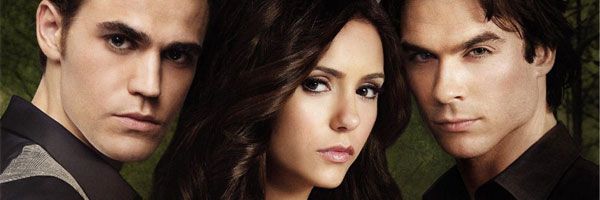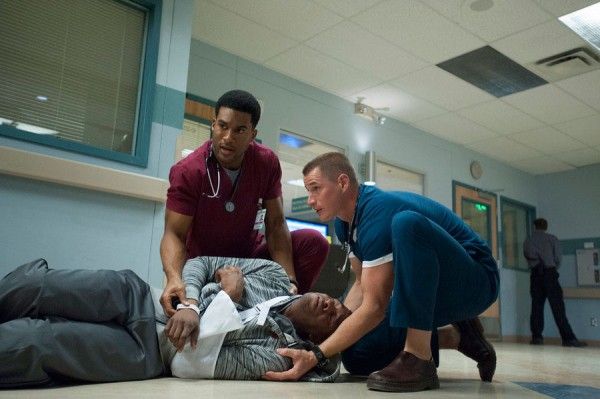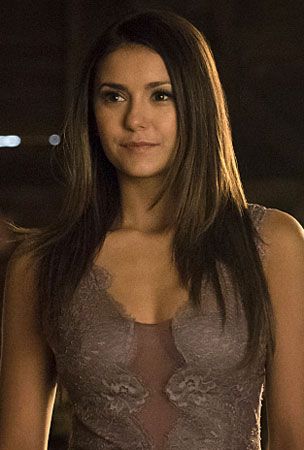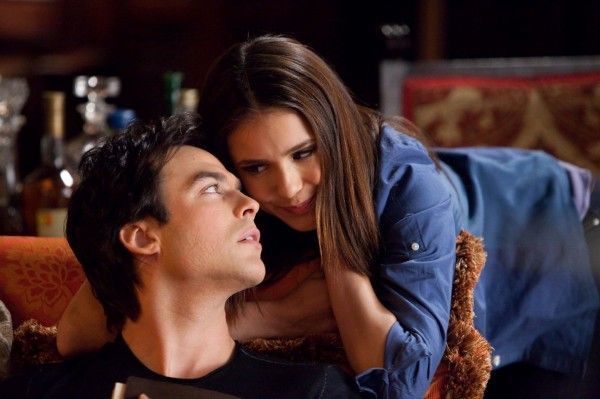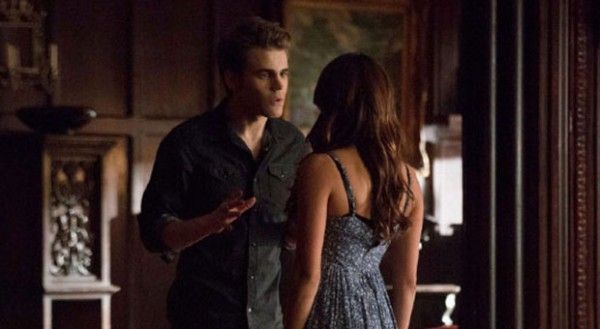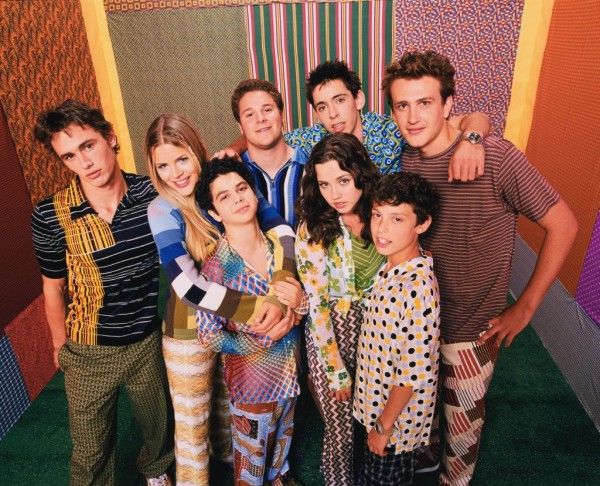While nearly 150,000 people are fighting to get into all sorts of big film, TV, author and comic book panels at the Convention Center for Comic-Con, NerdHQ hosts intimate celebrity panels in a theater that holds only 200 fans who get to ask all of the questions. The panels are often hilarious and sometimes very revealing, and the hour with Julie Plec (The Vampire Diaries, The Originals) and Gabe Sachs (The Night Shift, Freaks and Geeks) was no exception.
During the hour-long panel, Julie Plec and Gabe Sachs shared insights into what it’s like to be a writer and showrunner, how to break into the TV industry, especially when you have no connections, and how you deal with network notes. Plec also talked about whether Caroline and/or Stefan could fit in on The Originals, writing strong female characters, dopplegangers, the process of figuring out how to say goodbye to Elena on The Vampire Diaries, and Damon’s return to his bad-ass ways, while Sachs talked about what they went through while Freaks and Geeks was in production, and then on Undeclared. We’ve compiled the highlights of the conversation.
Their advice for aspiring young writers and showrunners who want to get into the TV industry:
GABE SACHS: I had absolutely no connections, whatsoever, into the business, at all. I couldn’t figure out how everyone was going to these parties in L.A. It made me crazy. So, I just started shooting homemade pilots with 50 bucks. I’d just get my friends who were actors and writers, and just go shoot anything that I could. One day, I went to New York and I begged every company I could find to lend me equipment and insurance and everything I needed, and shot a show. And I had so much fun doing it that I wanted to do another one. I had a manager who represented three people and answered his own phone in a closet. He had no connections either, but he tried and tried, and he finally got through to ABC. They took this tape of a show home by accident, and then they called me into a meeting and said, “We’d like to do this as a summer series.” But, I had no idea what that meant. I was like, “Fantastic! TV is not that hard. This was no big deal.” When they asked me what the budget was, the budget was so low, they tried not to laugh in the meeting, which I learned way later. They were like, “Okay, if that’s what you want to do with $18.” So, I went and made the show, and that’s how I got in. I just couldn’t figure it out, so I went and shot stuff. It still applies today. Now, there’s YouTube. It’s getting something done that you can show someone. And the writing thing is even harder because people are lazy. Reading a script is something that seems like it’s the biggest chore ever, for some people. You need to show them your work somehow, so it’s keeping at it. You also have to have elephant skin. It’s a business where you’re told how bad you are and how wrong this thing is, over and over again. To this day, you’ll be on a notes call and you just cannot believe the stuff you hear. With Freaks and Geeks, it was all the time. I’d hear, “Why are you making this show? When is the geek and the cheerleader making out?” And you go, “But, we didn’t grow up like that.” We went through that trouble, all the time.
JULIE PLEC: The joke is that the two hardest jobs to get in Hollywood are a bartending job and a writer’s assistant position. For actors and writers, those are the two jobs that lead you to a space where you could, as a bartender, meet somebody and catch somebody’s eye. And as a writer’s assistant, you sit in a room for 12 hours a day and take notes, shut up and don’t speak, and you hope that your willingness to do that without attitude, and to be a gentle and beautiful presence in that room, will earn you the right to write a scene, now and then. You become buddies with the writers, and then they’ll read your script that you’ve been writing in the free time that you don’t have. It’s a favor-based business, in a crazy way. The barrier to entry in the writing universe is huge. Write. Make. Post. Watch. Share.
How Caroline (Candice Accola) or Stefan (Paul Wesley), together or separately, might fit in, in New Orleans for The Originals:
PLEC: I think it would be hard to make them fit in, in a long-term situation, until The Vampire Diaries universe was over. Paul Wesley, for years, has been like, “I want to go on The Originals. I want to be in The Originals. That show is really cool. I like what you do. Can I go on The Originals?” So, it could happen. You never know. But Paul would then be like, “No, I’m not into that. Did I say I liked it? I’m not into that.” We’ll see.
How they try to incorporate feminist writing into the female characters on The Vampire Diaries and The Originals:
PLEC: We all consider ourselves to be feminists, in our own way, on The Vampire Diaries and The Originals. We’re all a bunch of gloriously independent, fiercely strong, borderline obnoxious women who have a lot of opinions and really believe in making sure that our female characters are strong. The dialogue that comes up a lot, especially in reference to The Vampire Diaries, is that you could look at some of the relationships that are ingénues or heroines and call them almost the opposite of feminist relationships, or toxic of self-destructive. That’s a conversation for another day and another panel. But what I really believe in, as a woman, which could shift in five years, is that I like women that are flawed. I almost said fucked up. I like character that are flawed. One of my favorite characters on television, for the last decade, is Meredith Grey (on Grey’s Anatomy). When you meet Meredith, she’s having sex with some dude she just met at the bar. She’s a mess. She’s all over the place. She’s practically bi-polar. But that woman is one of the coolest, most layered, fascinating, intriguing women on television, and that’s what I like. I like women that are really good at certain things and really bad at other things ‘cause that’s what I am, and I think that’s what human beings are. The idea that to be a good feminist writer, your female characters can only kick ass, never be vulnerable, never be weak, or never make bad decisions about the men in their lives, I just don’t find that to be an accurate portrayal of what that means to be a woman in this world. So, I tend to go for the more round-about way of promoting strength and fierceness.
What it’s like to write female characters, as a man:
SACHS: We’ve been very lucky to have staffs that are pretty much 50/50 in the room. When there’s a character that Jeff [Judah] and I are working on, we will always bring someone else in. And we try to have everyone bring stuff from their lives. You have a personal story that’s different than anyone else’s. If you write from that place, you will create very unique characters.
Getting the doppleganger storyline right on The Vampire Diaries, and whether it ever got confusing on set:
PLEC: It was horrible. Katherine Pierce is one of the greatest characters on The Vampire Diaries, of all time, and is quite possibly my favorite character. The problem is that we burnt out Nina [Dobrev] so badly, in Season 2. We were like, “What’s the big deal? You’re playing two characters. People do it on soap operas, all the time. Get over it!” We didn’t realize that she was breaking down her script from two different points of view. She had the homework she was doing for Elena, and the homework she was doing for Katherine. She was making clear, pointed choices for each character. And then, she had to make physical decisions about how to embody each character, which comes down to things like thicker eyelashes, a push-up bra and six-inch heels. So, she was making wardrobe, make-up, hair, physiological body movement, and acting decisions, every day, all the time.
And then, on top of all that, there were scenes where she actually had to act against nobody, or a stand-in who’s just got Katherine’s wig on. She’d have to do the whole emotion and crying thing to a stranger, and then change her clothes, turn around, and do the other side of it to yet another stand-in. As an actor, it’s a spectacular challenge. In production, it’s difficult because you’re shooting things twice and making hour-and-a-half make-up changes in the middle of the day. As a storyteller, the bummer was that, because it was so complicated and exhausting, we had to put the breaks on Katherine Pierce for awhile, and then, ultimately, we had to say goodbye to her. That was a bummer. But there’s storytelling, and then there’s humanity. We do torture our actors plenty, so every now and then, we have to be a little bit compassionate to their quality of life.
Deciding how they wanted to put Elena (Nina Dobrev) to rest, and whether they ever had any other ideas for how you wanted to leave that character:
PLEC: No. We had to write out our lead of the show and keep going, which is super fun. It’s really easy. Kevin [Williamson] and I knew how the show would end, back in Season 2. I’ve told this story a million times, but we sat in the mall and we came up with the ending, and we cried in the middle of the mall. Of course, the show shifted and changed and went on. And then, Nina decided to get on with her life, and all the power to her, but you have to roll with that, as a writer. But from the beginning, the thing that was the most critical with that was that Elena would not die. With Elena Gilbert, as the beating heart and soul and the root of the show, even if she’s not on camera or there in the room, we could not make that girl die. Yes, she became a vampire, but she wasn’t dead, dead. So then, it just became about, how do you take a character out of the playing field and not kill them? Well, you can send them off to live happily ever after, put them on a bus, and have them say, “I’m going to go to Kansas, get a job, get a degree and have a great life.” But where we were with Elena and Damon, at that point, there was no way that anyone was going to buy her going, “I choose me.” It just wasn’t going to happen. And to force that and say, “Forget everything about not just the Damon relationship, but the love triangle and her friendships with everybody, she’s just going to go start a new life.” We just couldn’t do that.
We had different versions of it, but the solution we came up with is what we call “the Sleeping Beauty spell,” for lack of anything more original. That felt right. It felt poetic, it felt fairy tale-esque, it felt sweet and sad, and it keeps her alive in our universe and keeps something for Damon to hope for, but also lets our characters move on and live their lives, and not have to spend this next year and a half of their show lives mourning the loss of this person. They can, at her wish, get on with their lives and be happy. So, we felt good about it. I know a lot of people out there did, and that some people are still pissed, but that’s okay. We’ll all move forward.
Whether Damon (Ian Somerhalder) go back to his bad-ass ways, now that Elena is out of the picture:
PLEC: Damon is going to be committed, the next 60 years of his life, to holding out and waiting for his girl. He is going to be very temperamental, as a result. In his great Damon ways, he’s going to have his ups and his downs, and his hilarious and not so hilarious incidents. He’s a guy who lost the love of his life, and is committed to waiting for her. So, imagine that. And that will evolve over upcoming seasons, as well. What does that mean? How do you define that? Ian [Somerhalder] will have more fun this year, being bad.
How much the network gets involved and gives notes:
PLEC: Every year, I think, “Oh, this is going to be the year that’s so easy.” Last year, I was like, “It’s Season 6. Stop calling me!” And then, with the first three scripts, they were like, “We have all of these questions.” I was like, “Shut up! Stop asking them! It’s going to be fine.” This year, because it’s the first year without Nina, everybody is on the notes calling like, “Just making sure it’s going to work out.” It’s always the first three or four episodes where you’re like, “We got this. It’s fine.” And then, it just becomes about logic, and character wants and drives. That’s checklist development stuff.
SACHS: The majority of people giving you these notes have never held a camera, never told a story, and never written a short story. Some of them have produced. So, you’re continually convincing them that it’s okay and it’s going to work out.
PLEC: It becomes about trust. I’m now on my fourth show for this network, but third that’s on the air, at the same time. I never disagree. I’m one of the nicest note receivers in all of Hollywood. But they gave me a note the other day, and I had to disagree. I said, “You guys might be right, but I see this so clearly that you have to let me get it wrong and realize that it’s wrong. You can’t force me out of this. I really, really, really believe in what we’re doing here. If I look at it and I realize that you were right, I will fix it because I will know that I made a mistake. But I know how to fix things, too, so you’ve gotta back off.” They were actually like, “We trust you. Go and do it.” It’s hard to get there.
SACHS: And you get things like, “I don’t know about this hair. And that color is just not going to work.” There’s a lot of sifting through the notes to find out what they really feel because it’s never clear.
How much network push-back they got when they were doing Freaks and Geeks:
SACHS: I’m trying to think of a nice way to put it. They were not crazy about the show, at the time. They kept moving us around. It was ridiculous. They also banned an episode because it was too controversial, which was our third episode. It made no sense. It was crazy because Lindsay and Kim Kelly did not get along in Episode 2, and we had to skip to Episode 4 where they’re best friends. Just to show you how it wasn’t just that moment, we went and did Just Shoot Me, and then we came back to do Undeclared. Judd [Apatow] was dealing with getting Jason Segel in the cast, and they were not going to have it. They said, “Absolutely not!” It was hard enough to get Seth [Rogen] in. Judd was always trying to figure out how to break Seth. He would go into network meetings and they’d be like, “I don’t like his voice. That guy is not going to make it. This is not worth it. I don’t know what we’re having this conversation about.” And then, Judd did Knocked Up and that same network was like, “We need a Seth Rogen project. How do we get a Seth Rogen project?” Seth said to me, “Don’t they know I’m the same guy they hated last year?” It was just non-stop. They didn’t realize any of that. And we always had a problem getting material in.
That they never wanted the show to end:
SACHS: First of all, I never wanted to leave the set. We just wanted to be there, all the time. That was our lives. We just were having such a good time. We felt it was going down, so we kept trying to figure out when to shoot he finale. We shot the finale three episodes before the actual ending of the show, so that we had it, in case. I have all of the behind-the-scenes from the show and stills that I shot. That moment where Judd and Paul [Feig] had to tell everyone, “We may come back,” there were tears pouring down everyone’s faces. It was just one of those things. We all had a great time, and we just wanted it to last forever. We’re always looking for stuff to do together.
Click here for more Comic-Con 2015 coverage.

